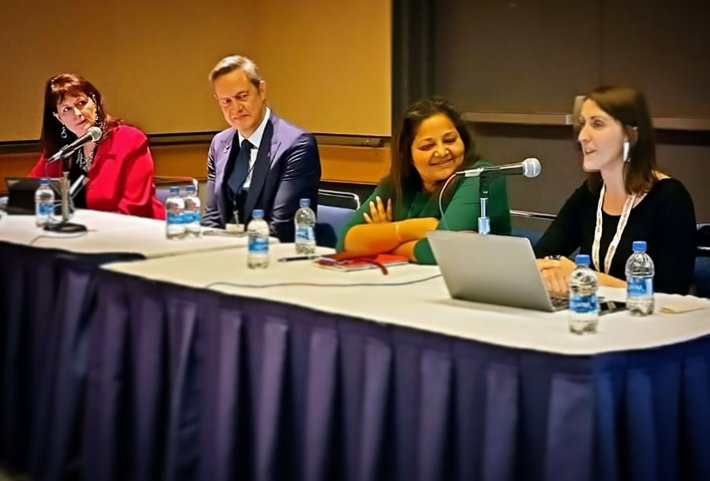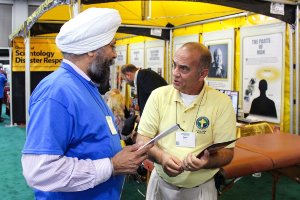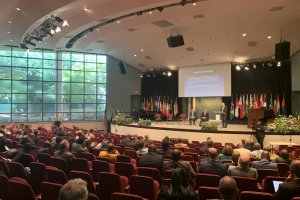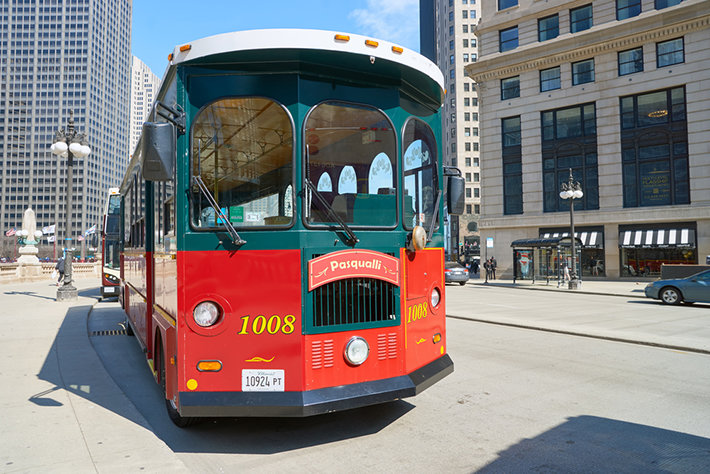The Parliament of the World’s Religions returned to Chicago this week to celebrate its 130th anniversary. It was here in 1893 at the Chicago World’s Fair that the organization began. It has continued its mission of bringing together leaders and followers of diverse religious faiths to work together toward a common goal as reflected in this year’s theme: “A Call to Conscience: Defending Freedom and Human Rights.”

The five-day interfaith event brought together religious leaders and groups from some 80 countries and 200 spiritual traditions.
In his keynote speech, Chicago Mayor Brandon Johnson pointed out that religion has “the power to guide people to a path of peace and nurture a spirit of mutual respect and collaboration.”
Vice President of the Church of Scientology European Office of Public Affairs and Human Rights, Rev. Eric Roux, moderated a presentation that forwarded this message and looked at what is needed to move the goal forward.
Titled “The Importance of Interfaith Coalitions in Defending Freedom of Religion or Belief” the panel featured religious freedom and human rights icons:
- Preeta Bansal, Global Council Chair URI (United Religions Initiative), the largest international organization of interreligious cooperation on the ground. Bansal was among the first chairs of the United States Commission on International Religious Freedom (USCIRF), a bipartisan U.S. government commission. She has also served as Solicitor General of the State of New York and as White House Special Advisor to President Barack Obama.
- Nadine Maenza, President of the IRF (International Religious Freedom) Secretariat, an organization that coordinates religious freedom roundtables around the world and works with an alliance on freedom of religion and belief comprising 40 member countries. Maenza served as USCIRF president from 2018 to 2022.
- Emina Frljak, Programs Coordinator of Youth for Peace, a Bosnia and Herzegovina-based organization run by young people, for young people, whose goal is to create conditions for peaceful coexistence between all religions in a country that experienced genocide not so long ago.
The vision of the Parliament of the World’s Religions is a just, peaceful and sustainable world where:
- Religious and spiritual communities live in harmony and contribute to a better world through their wealth of wisdom and compassion.
- Religious and cultural fears and hatred are replaced by understanding and respect.
- People everywhere are getting to know and care about their neighbors.
- The richness of human and religious diversity is woven into the fabric of community, civil, societal and global life.
- The world’s most powerful and influential institutions move beyond narrow self-interest to realize common good.
- The Earth and all life are cherished, protected, healed, and restored. All people commit to living out their highest values and aspirations.
Rev. Roux serves as President of the Union of the Churches of Scientology of France, Vice President of the European Office of the Church of Scientology for Public Affairs and Human Rights and Trustee for Europe of the International Council of URI. Author of numerous books and articles, Rev. Roux has served as a minister of the Church of Scientology for 30 years.
Rev. Roux is committed to defending and forwarding the freedom of religion or belief as the key human right.
“What people believe is their most ultimate freedom,” he says, “their link to God, or to the ultimate sense of life, and the expression of these inner beliefs is the most profound richness of a human being. This is what gives sense to our lives, whether we are religious or nonreligious, and what allows us to deal with all other freedoms in the frame of what we choose to believe, or not believe.
“When a state attempts to restrict the freedom of religion or belief of its citizens by discriminating against certain religions, inhibiting the right to choose or change one’s own faith, that state demonstrates it does not want Man to be free in all his aspects. In such a state, we can also witness a degradation of all other freedoms as a consequence to the degree to which the freedom of belief of its citizens is inhibited.”
_______________
From its beginnings, the Church of Scientology has recognized that freedom of religion is a fundamental human right. In a world where conflicts are often traceable to intolerance of others’ religious beliefs and practices, the Church has, for more than 50 years, made the preservation of religious liberty an overriding concern.
The Church publishes this blog to help create a better understanding of the freedom of religion and belief and provide news on religious freedom and issues affecting this freedom around the world.
The Founder of the Scientology religion is L. Ron Hubbard and Mr. David Miscavige is the religion’s ecclesiastical leader.
For more information, visit the Scientology website or Scientology Network.


